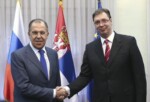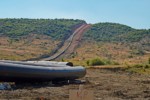Tim Willasey-Wilsey served for over 27 years in the British Foreign and Commonwealth Office. He is now Visiting Professor of War Studies at King's College, London. His first overseas posting was to Angola during the Cold War followed by Central America during the instability of the late 1980s. He was also involved in the transition to majority rule in South Africa and in the Israel/Palestine issue. His late career was spent in Asia including a posting to Pakistan in the mid 1990s.
OPINION — Vladimir Putin is the third modern dictator, after Napoleon and Hitler to make the mistake of invading Ukraine, albeit the first to try from east to west. There are five potential outcomes to his historic act of folly. The most desirable option, Putin’s defeat, also carries the most short-term risks.
There will be lots of serious predicaments over the next few weeks; to do with the safety of nuclear power stations, oil and gas markets, cyber warfare, weapons supplies and others which may yet emerge However behind all the detail lie five possible outcomes.
a. A negotiated settlement. Turkey, Israel, France and China have all been suggested as intermediaries. The problem here is that, at present, there is little to discuss, unless Putin has a change of heart and agrees to withdraw from Ukraine. Whether withdrawal includes Russia’s exit from the Crimea and the Donbass can be debated but Putin cannot be allowed to hang onto Kherson or other captured towns because he would spin any concessions as a victory, however pyrrhic. Once the results of the war-fighting phase are clearer there will be opportunities for diplomacy albeit with low levels of trust.
b. Russian occupation of all of Ukraine. This is still just possible. The fall of Kyiv could be followed quite quickly by a collapse of Ukraine’s impressive resistance. Equally the death or capture of President Zelensky could have a massive impact on morale. The Russian army could then advance upon Lviv in the west and then spend much of this year mopping up recalcitrant areas like Odessa in the south. The Ukrainian opposition would move to Poland and would be recognised widely as a ‘government in exile’. A repressive and debilitating Russian occupation would begin with an insurgency possibly lasting for years, thereby inhibiting future Russian moves against Georgia and the Baltic States.
c. Russian occupation of eastern Ukraine. Under this scenario the Russians would stop at the Dnieper River with two possible exclaves on the west bank; the western part of Kyiv and the route through Odessa to Transnistria in the south. The rump of the Ukrainian government, based in Lviv, would consolidate in the west and demand immediate EU and NATO membership as recompense for having lost half of its country and its whole coastline. These requests would be hard to resist. A severely weakened Russia would threaten retaliation but NATO might decide to face down these threats. The Dnieper would become the frontier of a new Iron Curtain from the Baltic to the Black Sea.
d. Failure of Putin’s invasion. Under this scenario the Russian army fails to take Kyiv or Odessa. More tanks and aircraft are destroyed. The Russians continue to take casualties and morale sinks further, with desertions amongst the troops and widespread unrest inside Russia itself. Putin is not going to surrender or concede his enclaves in the Donbass. Ukraine will be in no mood to offer terms. Instead Putin might choose to use one of his trump cards; in the form of Russia extremely potent cyber capabilities and renewed threats to use nuclear weapons. The implosion of Putin’s ambitions would be an intensely dangerous moment.
A variation on this scenario might see a palace coup against Putin in the face of a humiliating defeat abroad and a tanking economy at home. However Putin’s complete supremacy makes it a risky venture. Whoever challenged Putin would need to be sure of the support of the FSB security service. The chances of this are slight and there is no guarantee that an FSB-approved successor would be any better.
e. NATO provides a no-fly zone. Most Ukrainians and several prominent figures in the West are pushing this idea. It has its obvious attractions as we helplessly watch the suffering of the Ukrainian people. It would save Ukrainian lives for a time but it would be a serious mistake. It would lead to direct conflict between NATO and Russia with considerable danger of escalation. It would play to Putin’s narrative that Ukraine is a western puppet regime. And the Russian people would rally behind Putin.
When the major fighting is over in a few weeks or months time Europe will look and feel very different.
Ukraine’s hatred of Russian rule will return to the level of the 1930s when the Soviet Union imposed an unnecessary famine (the Holodomor). Ironically Putin will have done more to damage relations between Russia and Ukraine than anyone since Stalin.
Europe’s tolerance of Putin for the past 14 years (since the invasion of Georgia in 2008) will have ended. For as long as Putin is leader Russia will be frozen out of the global economy and will have pariah status except amongst its few remaining allies like Venezuela, Syria and Nicaragua.
China will not throw in its lot with Putin following his disastrous miscalculation and very public humiliation. It may even try to repair relations with the United States. China will still intend to control Taiwan but the invasion option will look less attractive.
Europe will struggle with rising fuel and commodity prices as it seeks to replace most of what it buys from Russia. Middle Eastern oil and gas (and therefore politics) will return to centre-stage.
After its sudden and surprising show of unity NATO will get a renewed lease of life and some increased defence spending. Sweden and Finland may decide to join.
There will be renewed impetus behind a more ambitious limitation of nuclear weapons.
At present the most likely outcome is somewhere between the partition of Ukraine and failure of the invasion. The first would be an ugly result which would satisfy neither side, leading to years of instability. The second would be preferable over the long-term but would involve moments of real global hazard.
by Tim Willasey-Wilsey
The original Article can be found @theCipherBrief






Leave a Reply